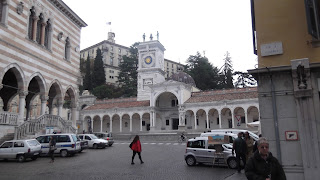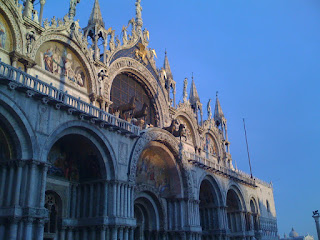Mark CHAP. 1
1:14–15
14. Now after that John was put in prison, Jesus came into Galilee, preaching the Gospel of the kingdom of God,
15. And saying, The time is fulfilled, and the kingdom of God is at hand: repent ye, and believe the Gospel.
PSEUDO-CHRYSOSTOM. (Vict. Ant. e Cat. 1 Marc.) The Evangelist Mark follows Matthew in his order, and therefore after having said that Angels minister, he subjoins, But after that John was put into prison, Jesus came, &c. After the temptation and the ministry of Angels, He goes back into Galilee, teaching us not to resist the violence of evil men.
THEOPHYLACT. And to shew us that in persecutions we ought to retire, and not to await them; but when we fall into them, we must sustain them.
PSEUDO-CHRYSOSTOM. (Vict. Ant. e Cat. in Marc.) He retired also that He might keep Himself for teaching and for healing, before He suffered, and after fulfilling all these things, might become obedient unto death.
BEDE. (ubi sup.) John being put in prison, fitly does the Lord begin to preach: wherefore there follows, Preaching the Gospel, &c. For when the Law ceases, the Gospel arises in its steps.
PSEUDO-JEROME. When the shadow ceases, the truth comes on; first, John in prison, the Law in Judæa; then, Jesus in Galilee, Paul among the Gentiles preaching the Gospel of the kingdom. For to an earthly kingdom succeeds poverty, to the poverty of Christians is given an everlasting kingdom; but earthly honour is like the foam of water, or smoke, or sleep.
BEDE. (ubi sup.) Let no one, however, suppose that the putting of John in prison took place immediately after the forty days’ temptation and the fast of the Lord; for whosoever reads the Gospel of John will find, that the Lord taught many things before the putting of John in prison, and also did many miracles; for you have in his Gospel, This beginning of miracles did Jesus; (John 2:11) and afterwards, for John was not yet cast into prison. (John 3:24) Now it is said, that when John read the books of Matthew, Mark, and Luke, he approved indeed the text of the history, and affirmed that they had spoken truth, but said that they had composed the history of only one year after John was cast into prison, in which year also he suffered. Passing over then the year of which the transactions had been published by the three others, he related the events of the former period, before John was cast into prison. When therefore Mark had said that Jesus came into Galilee, preaching the Gospel of the kingdom, he subjoins, saying, Since the time is fulfilled, &c.
PSEUDO-CHRYSOSTOM. (Vict. Ant. Cat. in Marc.) Since then the time was fulfilled, when the fulness of time was come, and God sent his Son, it was fitting that the race of man should obtain the last dispensation of God. And therefore he says, for the kingdom of heaven is at hand. (Orig. in Matt. tom. x. 14. v. Orig. de Orat. 25, 26. in Matt. t. 12 14). But the kingdom of God is essentially the same as the kingdom of heaven, though they differ in idea. For by the kingdom of God is to be understood that in which God reigns; (non occ. v. Chrys, in Matt. Hom. 19. in c. 6:9.). and this in truth is in the region of the living, where, seeing God face to face, they will abide in the good things now promised to them; whether by this region one chooses to understand Love, or some other confirmatione of those who put on the likeness of things above, which are signified by the heavens. () For it is clear enough that the kingdom of God is confined neither by place nor by time.
THEOPHYLACT. Or else, the Lord means that the time of the Law is completed; as if He said, Up to this time the Law was at work; from this time the kingdom of God will work, that is, a conversation according to the Gospel, which is with reason likened to the kingdom of heaven. For when you see a man clothed in flesh living according to the Gospel, do you not say that he has the kingdom of heaven, which is not meat and drink, but righteousness and peace and joy in the Holy Ghost? (Rom. 14:17)
The next word is, Repent.
PSEUDO-JEROME. For he must repent, who would keep close to eternal good, that is, to the kingdom of God. For he who would have the kernel, breaks the shell; the sweetness of the apple makes up for the bitterness of its root; the hope of gain makes the dangers of the sea pleasant; the hope of health takes away from the painfulness of medicine. They are able worthily to proclaim the preaching of Christ who have deserved to attain to the reward of forgiveness; and therefore after He has said, Repent, He subjoins, and believe the Gospel. For unless ye have believed, ye shall not understand.
BEDE. (ubi sup.) Repent, therefore, and believe; that is, renounce dead works; for of what use is believing without good works? The merit of good works does not, however, bring to faith, but faith begins, that good works may follow.
1:16–20
16. Now as he walked by the sea of Galilee, he saw Simon and Andrew his brother casting a net into the sea: for they were fishers.
17. And Jesus said unto them, Come ye after me, and I will make you to become fishers of men.
18. And straightway they forsook their nets, and followed him.
19. And when he had gone a little farther thence, he saw James the son of Zebedee, and John his brother, who also were in the ship mending their nets.
20. And straightway he called them: and they left their father Zebedee in the ship with the hired servants, and went after him.
GLOSS. (non occ.) The Evangelist, having mentioned the preaching of Christ to the multitude, goes on to the calling of the disciples, whom he made ministers of his preaching, whence it follows, And passing along the sea of Galilee, &c.
THEOPHYLACT. As the Evangelist John relates, Peter and Andrew were disciples of the Forerunner, but seeing that John had borne witness to Jesus, they joined themselves to him; afterwards, grieving that John had been cast into prison, they returned to their trade. Wherefore there follows, casting nets into the sea, for they were fishers. Look then upon them, living on their own labours, not on the fruits of iniquity; for such men were worthy to become the first disciples of Christ; whence it is subjoined, And Jesus said unto them, Come ye after me. Now He calls them for the second time; for this is the second calling in respect of that, of which we read in John. But it is shewn to what they were called, when it is added, I will make you become fishers of men.
REMIGIUS. For by the net of holy preaching they drew fish, that is, men, from the depths of the sea, that is, of infidelity, to the light of faith. Wonderful indeed is this fishing! for fishes when they are caught, soon after die; when men are caught by the word of preaching, they rather are made alive.
BEDE. (in Marc. i. 6) Now fishers and unlettered men are sent to preach, that the faith of believers might be thought to lie in the power of God, not in eloquence or in learning. It goes on to say, and immediately they left their nets, and followed him.
THEOPHYLACT. For we must not allow any time to lapse, but at once follow the Lord. After these again, He catches James and John, because they also, though poor, supported the old age of their father. Wherefore there follows, And when he had gone a little farther thence, he saw James the son of Zebedee, &c. But they left their father, because he would have hindered them in following Christ. Do thou, also, when thou art hindered by thy parents, leave them, and come to God. It is shewn by this that Zebedee was not a believer; but the mother of the Apostles believed, for she followed Christ, when Zebedee was dead.
BEDE. (ubi sup.) It may be asked, how he could call two fishers from each of the boats, (first, Peter and Andrew, then having gone a little further, the two others, sons of Zebedee,) when Luke says that James and John were called to help Peter and Andrew, and that it was to Peter only that Christ said, Fear not, from this time thou shalt catch men; (Luke 5:10) he also says, that at the same time, when they had brought their ships to land, they followed him. We must therefore understand that that transaction which Luke intimates happened first, and afterwards that they, as their custom was, had returned to their fishing. So that what Mark here relates happened afterwards; for in this case they followed the Lord, without drawing their boats ashore, (which they would have done had they meant to return,) and followed Him, as one calling them, and ordering them to follow.
PSEUDO-JEROME. Further, we are mystically carried away to heaven, like Elias, by this chariot, drawn by these fishers, as by four horses. On these four corner-stones the first Church is built; in these, as in the four Hebrew letters, (יהוה) we acknowledge the tetragrammaton, the name of the Lord, we who are commanded, after their example, to hear the voice of the Lord, and to forget (Ps. 45:11) the people of wickedness, and the house of our fathers’ conversation, which is folly before God, and the spider’s net, in the meshes of which we, like gnats, were all but fallen, and were confined by things vain as the air, which hangs on nothing; loathing also the ship of our former walk. For Adam, our forefather according to the flesh, is clothed with the skins of dead beasts; but now, having put off the old man, with his deeds, following the new man we are clothed with those skins of Solomon, with which the bride rejoices that she has been made beautiful. (Cant. 1:4. Vulg.) Again, Simon, means obedient; Andrew, manly; James, supplanter;f John, grace; by which four names, we are knit together into God’s host;g by obedience, that we may listen; by manliness, that we do battle; by overthrowing, that we may persevere; by grace, that we may be preserved. (supplantatione) Which four virtues are called cardinal; for by prudence, we obey; by justice, we bear ourselves manfully; by temperance, we tread the serpent underfoot; by fortitude, we earn the grace of God.
THEOPHYLACT. We must know also, that action is first called, then contemplation; for Peter is the type of the active life, for he was more ardent than the others, just as the active life is the more bustling; but John is the type of the contemplative life, for he speaks more fully of divine things.
Catena Aurea Mark 1





